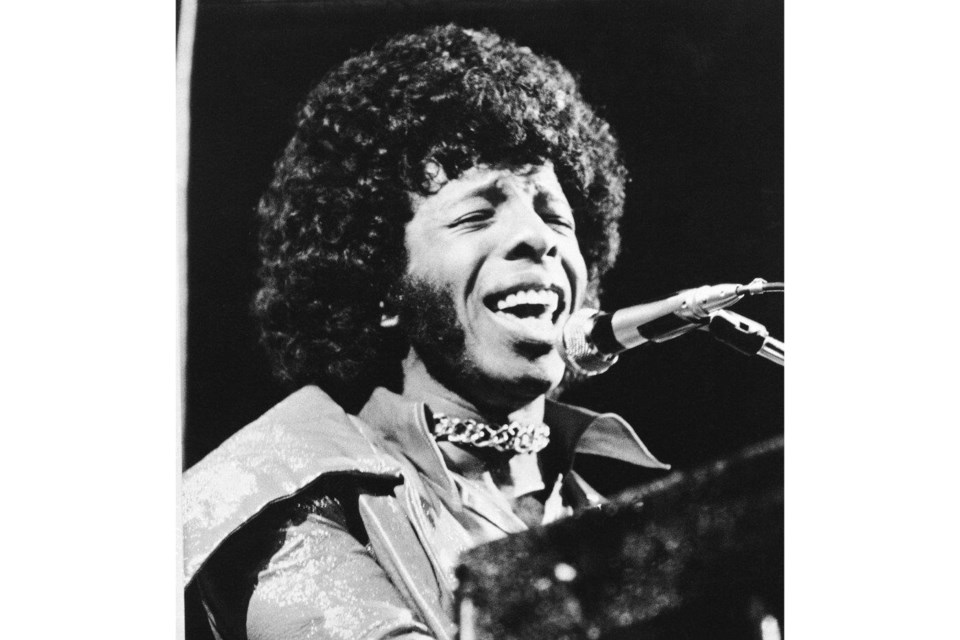NEW YORK (AP) — Sly Stone, the revolutionary musician and dynamic showman whose Sly and the Family Stone transformed popular music in the 1960s and ’70s and beyond with such hits as “Everyday People,” “Stand!” and “Family Affair,” died Monday at age 82.
Stone, born Sylvester Stewart, had been in poor health in recent years. His publicist Carleen Donovan said Stone died in Los Angeles surrounded by family after contending with chronic obstructive pulmonary disease and other ailments.
Formed in 1966-67, Sly and the Family Stone was the first major group to include Black and white men and women, and well embodied a time when anything seemed possible — riots and assassinations, communes and love-ins. The singers screeched, chanted, crooned and hollered. The music was a blowout of frantic horns, rapid-fire guitar and locomotive rhythms, a melting pot of jazz, psychedelic rock, doo-wop, soul and the early grooves of funk.
Stone’s group began as a Bay Area sextet featuring Sly on keyboards, Larry Graham on bass; Sly’s brother, Freddie, on guitar; sister Rose on vocals; Cynthia Robinson and Jerry Martini horns and Greg Errico on drums. They debuted with the album “A Whole New Thing” and earned the title with their breakthrough single, “Dance to the Music.” It hit the top 10 in April 1968, the week the Rev. Martin Luther King was murdered, and helped launch an era when the polish of Motown and the understatement of Stax suddenly seemed of another time.
Led by Sly Stone, with his leather jumpsuits and goggle shades, mile-wide grin and mile-high Afro, the band dazzled in 1969 at the Woodstock festival and set a new pace on the radio. “Everyday People,” “I Wanna Take You Higher” and other songs were anthems of community, non-conformity and a brash and hopeful spirit, built around such catchphrases as “different strokes for different folks.” The group released five top 10 singles, three of them hitting No. 1, and three million-selling albums: “Stand!”, “There’s a Riot Goin’ On” and “Greatest Hits.”
Sly’s influence has endured for decades. The top funk artist of the 1970s, Parliament-Funkadelic creator George Clinton, was a Stone disciple. Prince, Rick James and the Black-Eyed Peas were among the many performers from the 1980s and after influenced by Sly, and countless rap artists have sampled his riffs, from the Beastie Boys to Dr. Dre and Snoop Dogg. A 2005 tribute record included Maroon 5, John Legend and the Roots.
A dream dies, a career burns away
By the early ’70s, Stone himself was beginning a descent from which he never recovered, driven by the pressures of fame and the added burden of Black fame. His record company was anxious for more hits, while the Black Panthers were pressing him to drop the white members from his group. After moving from the Bay Area to Los Angeles in 1970, he became increasingly hooked on cocaine and erratic in his behavior.
On “Thank You (Falettinme Be Mice Elf Agin),” Stone had warned: “Dying young is hard to take/selling out is harder.” Late in 1971, he released “There’s a Riot Going On,” one of the grimmest, most uncompromising records ever to top the album charts. The sound was dense and murky (Sly was among the first musicians to use drum machines), the mood reflective (“Family Affair”), fearful (“Runnin’ Away”) and despairing: “Time, they say, is the answer — but I don’t believe it,” Sly sings on “Time.” The fast, funky pace of the original “Thank You (Falettinme Be Mice Elf Agin)” was slowed, stretched and retitled “Thank You For Talkin’ to Me, Africa.”
By the end of the decade, Sly and the Family Stone had broken up and Sly was releasing solo records with such unmet promises as “Heard You Missed Me, Well I’m Back” and “Back On the Right Track.” Most of the news he made over the following decades was of drug busts, financial troubles and mishaps on stage. Sly and the Family Stone was inducted into the Rock & Roll of Fame in 1993 and honored in 2006 at the Grammy Awards, but Sly released just one album after the early ’80s, “I’m Back! Family & Friends,” much of it updated recordings of his old hits.
A born musician, a born uniter
He was born Sylvester Stewart in Denton, Texas, and raised in Vallejo, California, the second of five children in a close, religious family. Sylvester became “Sly” by accident, when a teacher mistakenly spelled his name “Slyvester.”
He loved performing so much that his mother alleged he would cry if the congregation in church didn’t respond when he sang before it. He was so gifted and ambitious that by age 4 he had sung on stage at a Sam Cooke show and by age 11 had mastered several instruments and recorded a gospel song with his siblings. He was so committed to the races working together that in his teens and early 20s he was playing in local bands that included Black and white members and was becoming known around the Bay Area as a deejay equally willing to play the Beatles and rhythm and blues acts.
“A Whole New Thing” came out in 1967, soon followed by the single “Dance to the Music,” in which each member was granted a moment of introduction as the song rightly proclaimed a “brand new beat.” In December 1968, the group appeared on “The Ed Sullivan Show” and performed a medley that included “Dance to the Music” and “Everyday People.” Before the set began, Sly turned to the audience and recited a brief passage from his song “Are You Ready”:
“Don’t hate the Black,
don’t hate the white,
if you get bitten,
just hate the bite.”
Hillel Italie, The Associated Press



